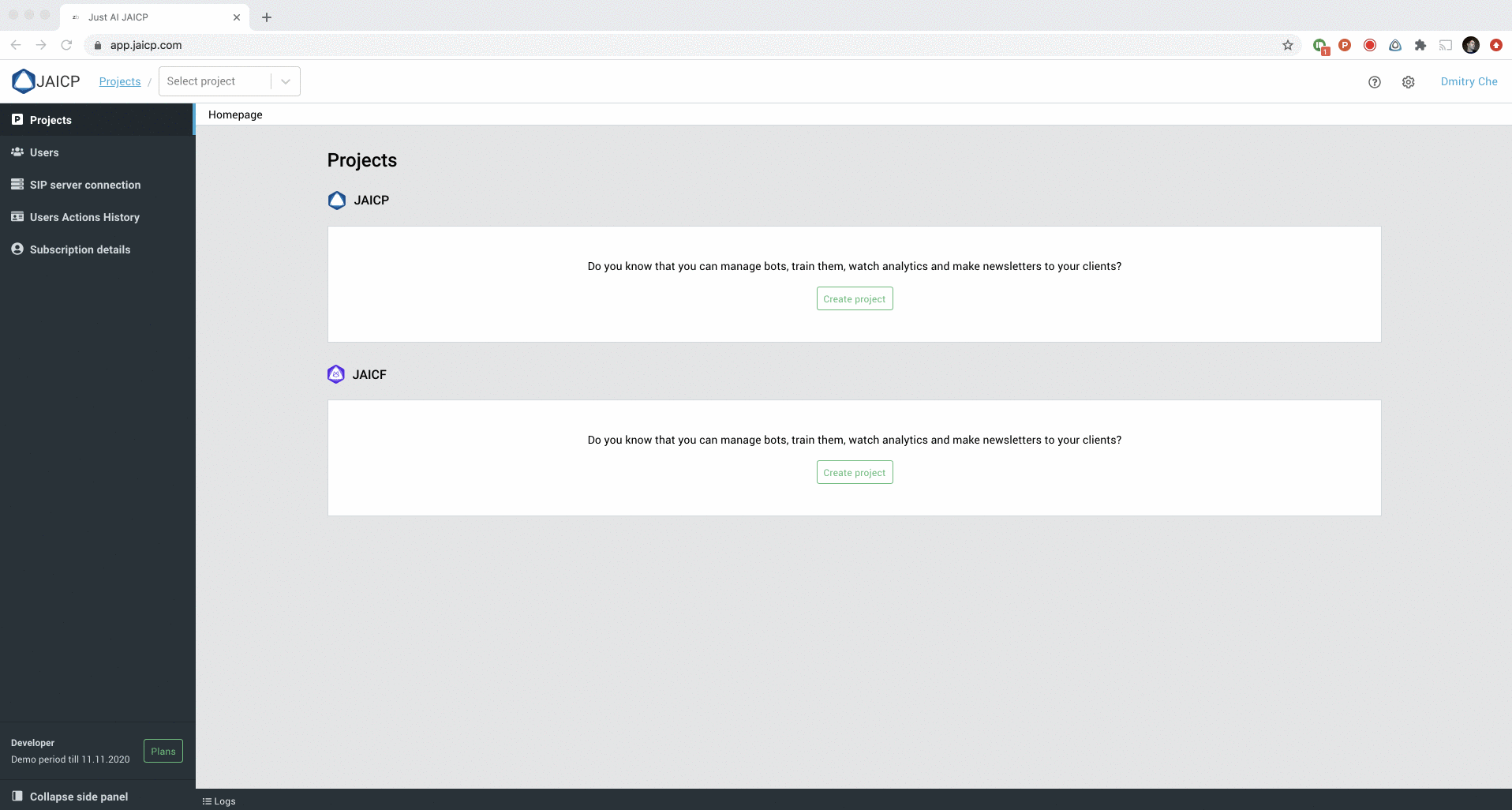
JAICP Channel
This channel provides full JAICP infrastructural support for JAICF. You can find quickstart JAICP guide here.
About
JAICP is used to connect your bots to JAICP infrastructure. This infrastructure will provide:
- AI-assisted dialogs analytics
- Dialogs and logs storage
- Metrics for your bots
- Multiple channel implementations
- Telephony bots and smart calls
- Cloud hosting
JAICP supports multiple channels, including Facebook, WeChat, Google Assistant, ZenDesk, and many many others. Also, there are JAICP-native channels, such as ChatWidget, ChatApi and Telephony channels.
Learn more about using JAICP with channels here.
How to use
1. Include JAICP channel dependency to your build.gradle
implementation("com.just-ai.jaicf:jaicp:$jaicfVersion")
Replace $jaicfVersion with the latest version
And use your preferred logger implementation to log incoming requests and responses for different channels. For example:
implementation("ch.qos.logback:logback-classic:1.2.3")
2. Create project in JAICP Application Panel

3. Create suitable JaicpServer or JaicpPollingConnector to connect your bot to JAICP infrastructure
Webhook can be created using Ktor or Spring Boot. Here is implementation example which uses provided Ktor Server:
JaicpServer(
telephonyCallScenario,
accessToken,
channels = listOf(
ChatWidgetChannel,
TelephonyChannel,
ChatApiChannel
)
).start(wait = true)
And Spring Boot example:
@Bean
fun jaicpServlet() = ServletRegistrationBean(
JaicpServlet(
JaicpWebhookConnector(
botApi = citiesGameBot,
accessToken = accessToken,
channels = listOf(
ChatWidgetChannel,
TelephonyChannel,
ChatApiChannel
)
)
),
"/"
).apply {
setLoadOnStartup(1)
}
Then you can use the public webhook URL (using ngrok for example) to register your channel in JAICP Web Interface.
Or use long polling connection. This connection does not require public webhook URL, here is an example:
JaicpPollingConnector(
botApi = citiesGameBot,
accessToken = accessToken,
channels = listOf(ChatWidgetChannel, TelephonyChannel, ChatApiChannel)
).runBlocking()
Access token can be acquired after creating project in JAICP Web Interface.
Channels
JAICP supports a list of channels for your bots. This enables you to serve all your channel-specific configurations in the JAICP Console instead of your JAICF code.
JaicpPollingConnector(
botApi = citiesGameBot,
accessToken = accessToken,
channels = listOf(TelegramChannel, SlackChannel)
).runBlocking()
But moreover this makes it possible to use JAICP features like Live Chats and Analytics (see below).
JAICP channels
JAICP also provides a set of additional channels:
- Telephony channel to connect your bot to telephony line
- Chat Widget channel to insert your bot to your website
- Chat API channel to easily interract with your bot from any third-party system
Features
Live Chats
Connecting your bot via JAICP enables a lot of customer engagement platform integrations, such as Chat2Desk , Salesforce , JivoSite, and others.
After you’ve created a project in JAICP Application Panel, you can create a customer engagement platform channel and connect it to your messaging channel.
If you added dependency on jaicp channel your channel’s JaicpCompatibleAsyncReactions (such as TelegramReactions , FacebookReactions, etc.) will receive extension method switchToLiveChat to switch to the live chat operator if the channel is configured in JAICP App Console.
state("HelpMe") {
activators {
intent("HelpMe")
}
action {
reactions.telegram?.say("We will shortly find someone to help you!")
reactions.telegram?.switchToLiveChat(message = "Client ${request.clientId} requested help.")
}
}
Analytics and Session Management
JAICP has a built-in Session mechanics to separate dialogs into sessions for better dialogue conversation analytics. It not only allows to use session data from a channel request, but also create an internal session in channels that don’t support sessions out of the box.
state("NewGame") {
activators {
regex("/start")
intent("NewGame")
}
action {
reactions.jaicp?.startNewSession()
reactions.say("Hello there! Let's play a game of numbers!")
reactions.say("I've picked a number from 1 to 100 and it's time for you to guess it right")
}
}
In this case whenever a new game starts we create a new dialogue session. This will afterwards allow us, for example, to generate some statistics like how many steps it takes for a client to guess a number.
JAICP Analytics API
JAICP also provides a number of methods to mark client messages and conversations. For example, you can define a result of conversation with jaicpAnalytics.setSessionResult. This result will be shown in analytic charts in JAICP Application Console.
state("Are you happy with our bot?") {
activators {
intent("Yes")
}
action {
reactions.say("Nice!")
jaicpAnalytics.setSessionResult("")
}
state("Are you happy with our bot?") {
activators {
intent("Yes")
}
action {
reactions.say("Nice!")
jaicpAnalytics.setSessionResult("Client is happy. Developer should get a raise.")
}
}
state("Are you happy with our bot?") {
activators {
intent("No")
}
action {
reactions.say("That's truly awful.")
jaicpAnalytics.setSessionResult("Client is sad. Developer should keep on improving.")
}
}
}
See more about analytics api JAICP Help Portal and In source code
